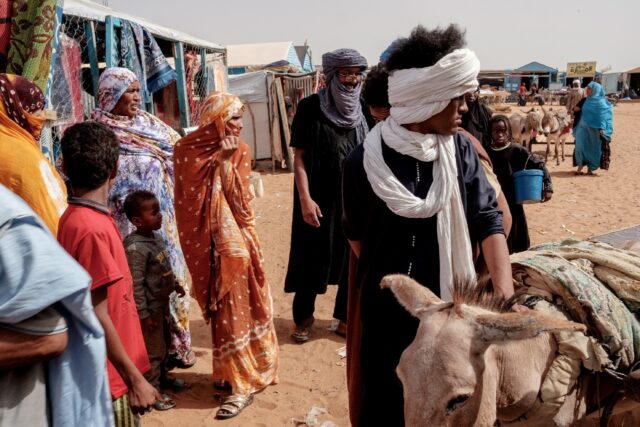Ehya sits down under a makeshift tent and prepares tea.
The herder in his fifties had lived in the bush of central Mali his entire life.
But in May, security in his home region had become untenable. Mali’s decade-long conflict was now too close.
Ehya made the grim choice to flee, becoming one of thousands of Malians who this year have fled to the safety of Mbera refugee camp just across the border in Mauritania.
“For years we tried to bide our time, to stay on our land, telling ourselves that it would blow over,” said Ehya, his head wrapped in a long white turban that falls over his chest.
But, he said, “people are killing like they slaughter chickens”.
Central Mali is a hotspot of the violence that has metastasised across the Sahel, leaving thousands dead and millions displaced.
Ehya — whose name, like others interviewed for this article, has been changed by AFP for his safety — recalled the day when a neighbouring settlement was attacked by jihadists.
“We knew that if we didn’t run, it would be our turn”, the pastoralist said. “We ran for our lives.”
Some of the displaced crowd into the outskirts of towns.
Many others head to Mbera — a haven not only from jihadists affiliated with Al-Qaeda or the Islamic State group (IS) but also from inter-communal reprisals and violent criminals.
Opened in 2012 not long after Mali’s conflict began, the camp is one of the largest in the Sahel, hosting more than 78,000 people. Some 8,000 Malians have fled there this year, according to the UN’s refugee agency.
“For the past six months, the camp has been receiving a large number of people from the areas of Sokolo, Dogofry, Ouagadou and Nampala” in central Mali, Abdoul Aziz Ag Mohamed, a camp administrator, told AFP.
Others have come from the Timbuktu region in the north of Mali.
“The camp has two speeds,” Mohamed said: “Old refugees”, who are now more autonomous, and “new refugees, who are in a state of emergency”.
‘White men’
Violence, initially confined to the north, spread to the centre of the country in 2015, and then to neighbouring Niger and Burkina Faso. Mauritania has so far been able to stem the expansion.
In Mali’s vast rural and desert wastelands, the Malian state has no permanent authority, and inhabitants — mostly nomads — live among the fighters.
“Daesh arrive in the camps, kill women, men and children indiscriminately then leave, taking the livestock,” Ehya said, using the Arabic acronym for IS.
AFP spoke to 10 refugees in the Mbera camp who all described the same pattern of attacks on civilians, which they say are increasing.
They also denounced deadly reprisals by all actors in the conflict: the “mujahideen” or jihadists, as well as by the military and a new force — Russia’s Wagner paramilitary group or, as it is sometimes described, the “white men”.
“The Malian army, the Wagner army, the mujahideen: we are caught in the crossfire,” Ehya said.
“The Malian army accuses us of supporting the mujahideen when we refuse to tell them where the jihadists are, and the mujahideen accuse us of being with the Malian state if we don’t become mujahideen.”
Mali’s ruling junta has brought in Russian operatives it describes as military trainers, while Western countries describe them as mercenaries from the pro-Kremlin Wagner group.
Rights monitors have implicated “white-skinned” fighters in massacres in central Mali in March.
Sexual violence
Another resident at the refugee camp, Seghad, recently arrived from Sokolo, some 200 kilometres (125 miles) south of Mbera.
The 25-year-old said she fled fighting between the army and jihadists — and violence committed against women.
“In neighbouring villages, (armed men) would come, blindfold women, take them to do what they have to do and then bring them back,” Seghad said.
Seghad described the assailants as Fulani, an ethnic group also known as Peul. Members of this group have been recruited by jihadists, prompting the Fulani community as a whole to be often accused of “terrorism”, say experts.
Ehya, Seghad and eight others interviewed by AFP all referred to Wagner, whose presence in Mali the government denies.
It “never operates alone. They are always with the Malian army,” said Ehya.
In Hombori, some 1,000 km (600 miles) from Mbera, Wagner fighters “came on market day and opened fire on herders who had come to pay for their livestock”, said Ehya, who comes from nearby and had relatives present during the attack.
The UN says it has opened an investigation into the alleged summary execution of numerous civilians by Malian soldiers “allegedly accompanied by foreign security personnel” in Hombori on April 19.
The Malian authorities have maintained that they respect human rights and will investigate if necessary.

COMMENTS
Please let us know if you're having issues with commenting.